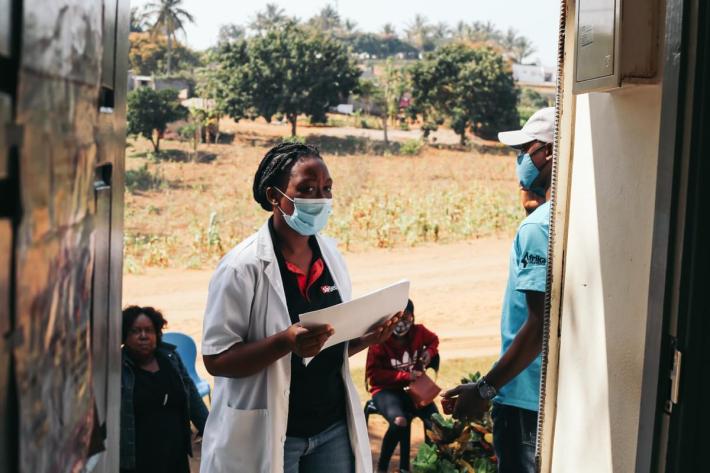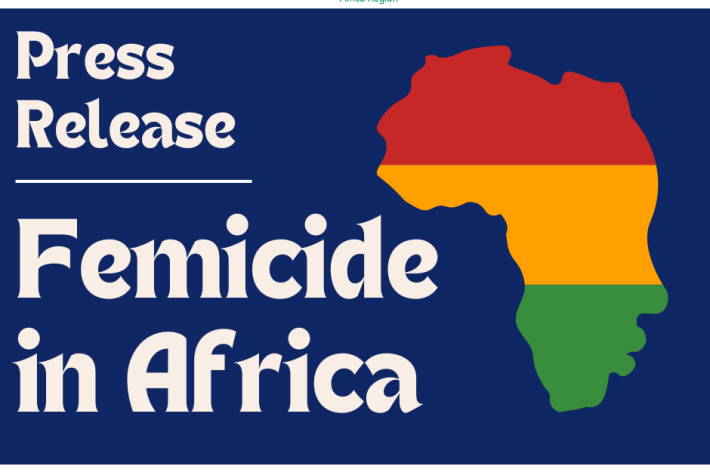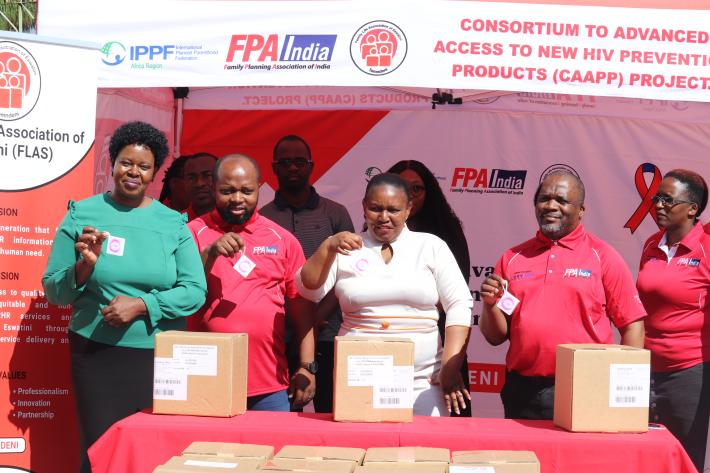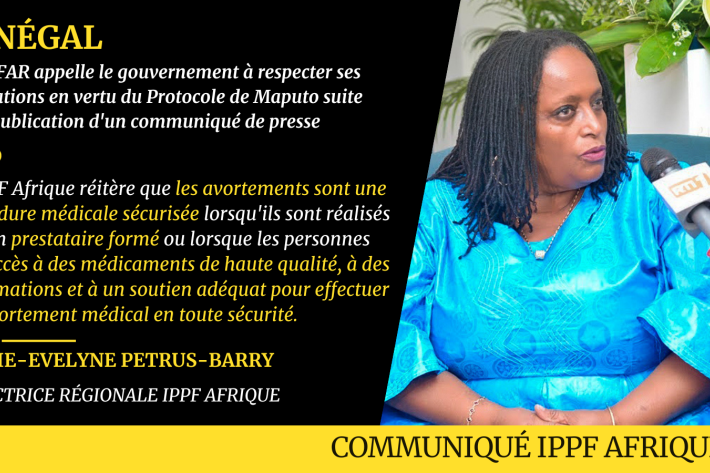Latest press releases
A selection of stories from across the Federation
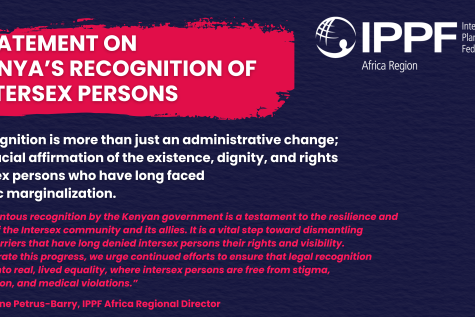
Kenya
IPPF Africa Region Welcomes Kenya’s Landmark Recognition of Intersex Persons
IPPF Africa Region Welcomes Kenya’s Landmark Recognition of Intersex Persons Nairobi, Kenya: 13 February 2025 – On 31 January 2025, Kenya has taken a groundbreaking step towards inclusivity and human rights by officially recognizing intersex as a sex marker alongside male and female in the Kenya Legal Notice 153 of 2025.


| 03 September 2022
IPPF endorses pleasure-inclusive sexual health via the Pleasure Principles
IPPF is publicly committing to pleasure-inclusive sexual health and rights ahead of World Sexual Health Day by endorsing The Pleasure Project's Pleasure Principles Ahead of World Sexual Health Day on 4 September 2022, the theme of which is Let's talk pleasure, the world's largest sexual and reproductive healthcare organization, the International Planned Parenthood Federation (IPPF), is publicly committing to pleasure-inclusive sexual health and rights (SRHR) by endorsing The Pleasure Project's Pleasure Principles. The seven principles, which include putting rights first, embracing learning, and loving yourself, promote a sex-positive, pleasure-based approach to sex and sexual health as opposed to standard prevention framing, which focuses only on avoiding pregnancy and sexually-transmitted infections (STIs). The Pleasure Principles are backed by new research with the World Health Organization, which shows that including sexual pleasure in sexual health education improves condom use compared to those that don't and increases knowledge and positive attitudes about sex, ultimately leading to better, safer sex and saving lives in the process. IPPF is adjusting to the shifting landscape of sexual health needs with seven pleasure-filled commitments, including incorporating staff training on pleasure-based sexual health and working with The Pleasure Project to integrate pleasure into more of its sexual and reproductive health programmes. The organization will also ensure that pleasure is a guiding principle in its upcoming 2023-2028 organizational strategy. Marie-Evelyne-Petrus-Barry, Regional Director for IPPF Africa Region, said: "IPPF has always believed that pleasure is fundamental to well-being and that comprehensive sexual education globally must be drastically improved, stepping away from fear-based framing and stepping into one rooted in understanding sexual and reproductive health more holistically. "We also must be honest that most people, especially young people, do not just have sex for reproductive reasons, but have sex for pleasure. We must do more to help people understand the spectrum of pleasure so they can better understand their own needs and wants, and we hope, have a better, safer and healthier sex life." IPPF Africa Region has stepped up to the mark with the Treasure Your Pleasure digital campaign for young people, which has already sparked a conversation on sexual pleasure, sexual health and sexual rights on social media. More than 8 million people have viewed the content, which includes information about pleasure-based sex and relationships, sexual safety and consent, and more than 30,000 new people have followed the region on social media to learn more about their sexual health and wellbeing. IPPF plans to implement learnings from the campaign across other regions. Anne Philpott, Founder of the Pleasure Project, said: "The Pleasure Project is delighted that IPPF has endorsed the Pleasure Principles. As the largest global provider of sexual and reproductive health services, it shines a light on this long stigmatized blind-spot in sexual health. "Pleasure, love and desire are key reasons people have sex and relationships. Yet health services have been focused on stopping disease or preventing pregnancy for too long, limiting their appeal and impact. Our recent evidence review with the World Health Organization demonstrates that pleasure-inclusive sexual health improves sexual health and ultimately saves lives. "This commitment is not only critical in ensuring the more than 200 million essential services they provide every year are honest, sex-positive and effective but also that the people they serve are respected as wanting to live fulfilling lives. "We are excited to partner with IPPF to put their commitment into action with staff training, implementation of pleasure-based sexual health and learning lessons on how to best deliver this new evidence and pleasure-filled best practice." *** For media enquiries, please contact Karmen Ivey at [email protected] or Amina Khan on [email protected] About the International Planned Parenthood Federation The International Planned Parenthood Federation (IPPF) is a global service provider and advocate of sexual and reproductive health and rights for all. For over 65 years, IPPF, through its 118 Member Associations and 15 partners, has delivered high-quality sexual and reproductive healthcare and helped advance sexual rights, especially for people with intersectional and diverse needs that are currently unmet. Our Member Associations and partners are independent organizations that are locally owned, which means the support and care they provide is informed by local expertise and context. We advocate for a world where people are provided with the information they need to make informed decisions about their sexual health and bodies. We stand up and fight for sexual and reproductive rights and against those who seek to deny people their human right to bodily autonomy and freedom. We deliver care that is rooted in rights, respect, and dignity - no matter what. Notes to Editors World Sexual Health 2022 has the theme 'Let's talk pleasure' - find assets here The full list of Pleasure Principles can be found on www.thepleasureproject.org and include: Love Yourself Embrace Learning Talk Sexy Be Flexible Think Universal Rights First Be Positive A pleasure-based approach celebrates sex, sexuality and the joy and wellbeing derived from these and creates a vision of good sex built on sexual rights. It focuses on sensory, mental, physical and sensual pleasure to enable individuals to understand, consent to, and control their bodies and multi-faceted desires. Well-being, safety, pleasure, desire and joy are the objectives of a programme with a pleasure-based approach. This approach measures empowerment, agency, and self-efficacy by whether or not an individual has been enabled to know what they want and can ask for it and request this of others in relation to their sexuality, desires and pleasure. [ The Pleasure Project, 2019] The full list of IPPF's commitments includes: At least two Member Associations commit to testing elements of the Pleasure Principles in their work Incorporate training of staff across the Federation on Pleasure Based Sexual Health and the evidence that supports it Look to expand the Treasure Your Pleasure Campaign by the Africa Regional Office to other regions and use the learnings to inform Pleasure based-content across all regions A specific module on advocacy for pleasure in the IPPF internal training modules To work with the Pleasure Project to better understand how to incorporate Pleasure into our programmes with a focus on youth To work with at least thee sex positive, pleasure-based influencers on social media content Continue to ensure Pleasure is a principal guiding the new IPPF Strategy 2023-2028

| 18 August 2022
Ugandan LGBTIQ+ Organisation Banned by Government
Nairobi – 18 August 2022 – On 3 August 2022, the Ugandan National Bureau for Non-Governmental Organizations unfairly halted the activities of Sexual Minorities Uganda (SMUG) - a prominent lesbian, gay, bisexual, transgender, and queer (LGBTIQ+) rights organization - for failing to meet the bureau's registration requirements. SMUG has provided sexuality education and advocated for LGBTIQ+ healthcare since 2004 and is well-known for providing services and guidance to the LGBTIQ+ community in Uganda. The organization also contributes to Uganda's health goals, including the country's HIV/AIDS strategy, which includes the provision of healthcare to vulnerable and marginalized populations. Although SMUG applied to the Uganda Registration Services Bureau (URSB) in 2012, the URSB declined the organization's request on the grounds that SMUG was "operating illegally", a position the organization petitioned with no positive response. In a clear case of harassment and restrictions against Ugandan rights groups working on LGBTQI+ rights, the URSB further asserted that registering SMUG's name would be difficult, calling it "undesirable and un-registrable". In response to the ban, Marie-Evelynne Petrus Barry, Africa Regional Director for the International Planned Parenthood Federation (IPPF), urged the Ugandan Government to review its decision to suspend SMUG and to work towards accommodating the organization's mandate of advancing the rights of the LGBTIQ+ community in Uganda. She said: "As a global human rights organization and the world's largest sexual and reproductive healthcare provider, the International Planned Parenthood Federation upholds the rights of all people, regardless of their sexual orientation. "The Ugandan Government's ban of SMUG has created huge anxiety among health service providers, human rights defenders, and members of the LGBTIQ+ community, who risk their lives daily so that LGBTQI+ people can access healthcare and information just as any other person would. "We ask the Ugandan Government to urgently reconsider its decision to suspend SMUG and to put an end to laws and policies that criminalize, target and endanger members of the LGBTIQ+ community and the organizations that advocate for their rights." Petrus-Barry added: "IPPF works to ensure that people with diverse sexual orientation, gender identity and/or expression, and sex characteristics (SOGIESC) – including lesbian, gay, bisexual, trans, and intersex people have access to the full set of human rights enshrined in international human rights laws. IPPF is willing to work with the Ugandan Government and other stakeholders to ensure that all Ugandan people can access these rights without restraint." ENDs Media Contacts: Mahmoud Garga, Lead Specialist - Strategic Communication, Media Relations and Digital Campaigning, IPPF Africa Regional Office (IPPFARO) – email: [email protected] -Phone +254 704 626 920 ABOUT IPPF AFRICA REGION (IPPFAR) The International Planned Parenthood Federation Africa Region (IPPFAR) is one of the leading sexual and reproductive health (SRH) service delivery organizations in Africa and a leading sexual and reproductive health and rights (SRHR) advocacy voice in the region. Headquartered in Nairobi, Kenya, the overarching goal of IPPFAR is to increase access to SRHR services to the most vulnerable youth, men and women, in sub-Saharan Africa. Supported by thousands of volunteers, IPPFAR tackles the continent's growing SRHR challenges through a network of Member Associations (MAs) in 40 countries. We do this by developing our MAs into efficient entities with the capacity to deliver and sustain high-quality, youth-focused and gender-sensitive services. We work with Governments, the African Union, Regional Economic Commissions, the Pan-African Parliament, and United Nations bodies, among others, to expand political and financial commitments to sexual and reproductive health and rights in Africa. Learn more about us on our website. Follow us on Facebook, Twitter, Instagram and YouTube.

| 28 July 2022
Historic Moment for Benin as New Law Legalizing Abortion Adopted
The International Planned Parenthood Federation (IPPF) welcomes the news of abortion law reform in Benin. On 20 October 2021, the Benin National Assembly voted to significantly widen the conditions under which women and gender non-confirming people can legally access abortion care. The new law will now allow women and gender non-conforming people to end their pregnancy within the first three months if it is likely to "aggravate or cause material, educational, professional or moral distress, incompatible with the woman or the unborn child's interest.” Under Benin’s previous abortion law, it was only permissible to seek abortion care if the pregnancy ‘threatened the life of the mother’, was ‘the result of a rape or incest’ or when ‘the unborn child has a particularly severe affection’. In a country where an estimated that 200 women die annually from unsafe abortion, the new law will undoubtedly save lives. IPPF is proud that its Member Association in the country, Association Beninoise pour la Promotion de la Famille (ABPF), was directly involved in advocating for change in the abortion law. The organization’s involvement began years ago, when it intensified its advocacy activities with key stakeholders, most notably the Network of Parliamentarians for Population and Development, made up of several Members of Parliament (MPs) committed to championing sexual reproductive health and rights (SRHR) for all. Among its activities, ABPF organized capacity building and advocacy sessions with parliamentarians. It also proposed an extension of the law on abortion in a code on sexual and reproductive health, which was developed and presented to the MPs. Mr. Christian Agbozo, Executive Director of ABPF says that it was this close collaboration with lawmakers and other key stakeholders, both in the private and public sector that led to this success. "The new law is a step forward for the rights of Beninese women. ABPF’s involvement in advocating for abortion liberalization was necessary not only to ensure women's right to decide, but to also allow ABPF service providers to provide comprehensive abortion care services without being subjected to prosecution in the future. The new law will help more women receive safe abortion care and exercise their reproductive rights and freedoms. It is a proud moment for us all,” he says. IPPF Africa Regional Director Mrs. Marie-Evelyne Petrus-Barry acknowledged Benin’s progressive step in voting for the legalization of abortion. “As an institution that believes in the unreserved upholding of the human rights of all people, we affirm that this is indeed a great win not only for the women and girls of Benin, but for women and girls across the region. Following in the footsteps of two other countries in the continent, South Africa and Cape Verde, Benin has demonstrated its commitment to women’s reproductive freedom, and we hope that other African countries will follow” she said. Mrs. Petrus-Barry further reiterated IPPF’s commitment to advocating for the repeal of retrogressive laws and policies that infringe on their reproductive autonomy, and development of those that allow them to exercise their sexual reproductive health and rights. Her sentiments were echoed by IPPF’s Director General, Dr. Alvaro Bermejo. “We are extremely pleased to see the long-awaited expansion of abortion provision in Benin and applaud the National Assembly for recognising the dignity, humanity and sexual and reproductive rights of Beninese people seeking abortion care. We are also proud of our Member Association, ABPF, for its continued hope and advocacy in Benin.” Dr. Bermejo acknowledged the dedicated efforts by African countries to push back against colonial and archaic abortion laws that hold their communities back. “IPPF is honored to be a part of that movement and will never stop fighting for safe and legal abortion care for all those who need it.” For more updates on our work, follow IPPF Africa Region on Facebook, Twitter, Instagram and You Tube.

| 28 July 2022
A Huge Victory for LGBTIQ+ Equality in Botswana: Court Upholds Ruling Decriminalizing Same-Sex Relationships
Nairobi, 30 November 2021 - The International Planned Parenthood Federation (IPPF) and the Botswana Family Welfare Association (BOFWA) celebrate and welcome Botswana’s Court of Appeal’s decision to uphold a 2019 ruling that decriminalized same-sex relationships. On Monday 29 November 2021, five judges from the Court of Appeal unanimously ruled that criminalising same-sex relationships was a violation of the constitutional rights of Lesbian, Gay, Bisexual, Transgender, Intersex and Queer (LGBTIQ+) individuals to dignity, liberty, privacy and equality. The offending sections of the Penal Code have been removed accordingly, as they were found to violate liberty, privacy and dignity and cause undue discrimination to the LGBTIQ+ community. This decision has affirmed Botswana’s commitment to uphold the democratic rights of all its citizens, including their full and complete sexual and reproductive health and rights (SRHR). This appeal was the third to be heard by the full bench of the court of Appeal concerning constitutionality of the state actors, or sections of statutes challenged as breaching the fundamental rights of members of the LGBTIQ+ community. BOFWA, a member association of IPPF, plays a leading role in providing and championing access to high-quality and integrated SRHR for all those who are marginalised, underserved and in particular those groups who are often left behind. These communities include vulnerable and key populations such as the LGBTIQ+ communities and sex workers. In Partnership with SRHR and LGBTIQ+ activists, BOFWA advocates for the SRHR of all people of Botswana, regardless of their sexual orientation, gender identity or status in society. Over the years, BOFWA has argued that criminalization of same-sex relations and associated stigma and discrimination gravely reduces access to SRHR services, including HIV interventions and other sexually transmitted infections. A distinguished leader in the SRHR sector, BOFWA was the first non-governmental organization in the country to provide antiretroviral treatment to key populations. Ms. Una Ngwenya, BOFWA’s Executive Director, expressed jubilation at the Court of Appeal’s decision. “The ruling will go a long way in addressing issues of stigma and discrimination against members of the same-sex community in Botswana. We believe that this decision will inspire members of this community to freely seek SRHR services and go on with their lives like everyone else; they don’t need labels but rather targeted and differentiated services! Still, we will not sit on our laurels, it is not over yet, members of the same-sex community face various challenges beyond the law; attitudes of service providers, moralizing sex and sexuality and complexities surrounding sexual and gender-based violence among communities remain critical. While we welcome the Court of Appeal’s judgement, we urge the Government to put in place stringent measures across the country’s health care system that will address the barriers and disparities preventing the LGBTIQ+ community’s access to sexual and reproductive health services. Equally, we call for the guaranteed safety and protection of our fellow civil society movements that continue to fight barriers and disparities that hinder this community’s access to sexual reproductive health services,” she says. Ms. Ngwenya adds that BOFWA and IPPF will not relent in their quest to advocate for SRHR-related issues, including laws that provide access to safe abortion and decriminalize sex work. “IPPF welcomes Botswana’s ruling in favour of LGBTIQ+ equality and encourages other African countries to follow it. We reiterate our commitment to building the capacities of all our Member Associations, their partners and stakeholders, in ensuring that the sexual reproductive health and rights of all citizens across the world are upheld, unreservedly,” said Marie-Evelyne-Petrus-Barry, IPPF Africa Regional Director. END Media Contacts: -Mahmoud Garga, Lead Specialist - Strategic Communication, Media Relations and Digital Campaigning, IPPF Africa Regional Office (IPPFARO) – email: [email protected] -Phone +254 704 626 920 Maryanne Wanyama, Communications Office, IPPFARO, Nairobi (Kenya) - Email: [email protected] – Phone: +254 707 952 990 ABOUT IPPF AFRICA REGION (IPPFAR) The International Planned Parenthood Federation Africa Region (IPPFAR) is one of the leading providers of quality sexual and reproductive health (SRH) services in Africa, and a strong and resolute sexual and reproductive health and rights (SRHR) advocacy voice in the region, committed to gender equality and to ensuring that women, girls and young people realize their rights and have control over their own bodies, their lives and their futures. Headquartered in Nairobi, Kenya, the overarching goal of IPPFAR is to increase access to integrated SRHR services to the most vulnerable youth, men, and women in sub-Saharan Africa. Supported by thousands of volunteers, IPPFAR tackles the continent’s growing SRHR challenges through a committed network of Member Associations (MAs) in 40 countries. We do this by supporting and empowering the MAs into efficient entities with the capacity to deliver and sustain high-quality, youth-focused and gender-transformative services. We work with governments, the African Union, Regional Economic Commissions, the Pan-African Parliament, United Nations bodies among others to expand political and financial commitments to sexual and reproductive health and rights in Africa. Learn more about us on our website. Follow us on Facebook, Twitter, Instagram and You Tube.

| 28 July 2022
Guinea: Horrific cases of rape and murder of girls must urge authorities to strengthen their efforts to prevent and combat sexual violence
Guinean authorities must take immediate measures to ensure thorough and impartial investigation of recent rapes and sexual assaults followed by murders committed over the course of just eight days and bring perpetrators to justice, Amnesty International and the International Planned Parenthood Federation (IPPF) said today. They must also increase their efforts to fight sexual violence by strengthening prevention, supporting access to justice for survivors and adopting a special law on violence against women. Six girls aged between three and 16, and a woman were sexually assaulted, and some were raped between 25 November and 2 December 2021. Two of the girls have died as a result of the violence. “Rape is all too commonplace in Guinea. Authorities should urgently strengthen their efforts to prevent and combat sexual violence in Guinea," said Samira Daoud, Amnesty International West and Central Africa director. Rape of girls On 2 December 2021, the Office for the Protection of Gender, Childhood and Morals (OPROGEM) presented a 24-year-old man charged with the rape of a three-year-old girl in the district of Gbessia in the capital Conakry. On 30 November another three-year-old girl was raped in Batè-Nafadji in the eastern region of Kankan. On 27 November, a 12-year-old girl was raped by two men on her way home in the town of Sanoun. This came just a day after the death of another 12-year-old girl in the north-eastern town of Siguiri. In the urban commune of Labé, west-central region of Guinea, a three-year-old girl was gang raped on 26 November. Local organization, "Agir pour le Droit Féminin", which met with the three-year-old girl's parents on 7 December, told the organizations that she was abducted when going to buy candy not far from the family home. She was then taken to an uninhabited house and sexually assaulted until she died. The girl’s father who met with the prosecutor confirmed his demand for justice for his daughter. One of the alleged perpetrator’s father requested forgiveness from the girl’s family but they refused. The rapes of girls followed the rape of a woman on 25 November while she was in a hospital in the north-western town of Kamsar for a surgery. The hospital management announced three days later they had "arrested the alleged perpetrator" -who is an external service provider- and taken him to the gendarmerie. The same day, a 16-year-old girl was also raped by several men in Kankan. “The authorities must ensure thorough and impartial investigations of these rape cases without delay and anyone found guilty must be brought to justice," said Marie-Evelyne Petrus-Barry, IPPF Africa Regional Director. “Survivors must receive access to medical care and psychosocial support as well as legal aid to access justice and redress.” More than 331 rape cases reported since the beginning of the year Since the beginning of the year, OPROGEM and the Special Brigade for the Protection of Vulnerable Persons (BSPPV in French) have already dealt with 331 rape cases. In 2020 alone, they dealt with 374 cases, a number which reflects only the tip of the iceberg according to NGOs working on sexual violence survivors, journalists, police and gendarmerie. This is due to the stigma associated with rape in Guinea, which often leads to not reporting the crime and not filing complaints, and often such cases are handled through mediation and out-of-court settlements between the victims or their families and the alleged perpetrators or their families. The recent rape cases follow another case that sparked a strong public reaction across the country last month. M’Mah Sylla, a 25-year-old woman, was allegedly raped by doctors at a non-licensed clinic in Conakry, where she went for treatment. She got pregnant as a result, and the same perpetrators raped her again when she returned to the clinic to seek an abortion. The rape caused injuries that could not be healed despite seven surgeries. The victim died on 20 November in Tunis (Tunisia) where she was medically evacuated following a government intervention. Following M’Mah Sylla’s death, women staged protests on 22, 24 and 30 November in the towns of Labé, Kindia and N’Zérékoré, demanding justice for all victims of rape. On 21 November, the Ministry of Justice said three of the four alleged perpetrators of M’Mah Sylla’s rape had been detained in Conakry prison. The government also presented its condolences to her family on behalf of the head of state. Activists spoke out on the surge in rape cases. Djenab Boiro of “Mon Enfant, Ma vie” a local organization, told Amnesty International during a meeting in Conakry: “Even dead, M'Mah Sylla deserves justice. I am convinced that the day the perpetrators will be sentenced to the punishment they deserve, her soul will finally rest in peace. We have had too many cases like M'Mah Sylla’s and we hope and dream of not having any more.” “Authorities have taken some steps in the right direction in recent years which we welcome, such as the creation in 2020 of a special unit within the gendarmerie to fight sexual violence. In addition, local women’s rights organizations have played and continue to play a major role in speaking up against sexual violence, together with some media,” said Samira Daoud "Despite this situation, the persistence of rape cases, especially of girls, calls for much greater efforts to raise awareness among the public to prevent sexual violence, to protect the survivors, and ensure their timely access to justice and reparations as well as to bring perpetrators to account. This includes but is not limited to the adoption of a special law on violence against women, as recommended by the CEDAW Committee,” concluded Marie-Evelyne Petrus-Barry. Read this article in French here. To arrange an interview, please contact: Amnesty’s Press Office Email [email protected]; West and Centra Africa’s Twitter: @AmnestyWaro; and/or IPPF Africa Region Lead Communication Advisor, Mr. Mahmoud Garga ([email protected])

| 28 July 2022
Abortion hearings: What’s going on in Namibia?
Namibia is under the spotlight this month as it resumes public hearings on abortion on 16 January. This follows the hearings which took place late last year, and will hopefully play an important role in the liberalization of abortion laws in the country. The current laws regulating abortion are no longer fit for purpose – not least because the Abortion and Sterilisation Act of 1975 was adopted under apartheid South African rule and has since been repealed in South Africa. The Act currently permits abortion only in very limited circumstances, and imposes criminal penalties on women who obtain and those who perform abortions outside of this limited scope. Those who can afford it are forced to travel to South Africa for abortion care, but this option is out of reach for many women. The law, therefore, impacts far more heavily on poor and black women, perpetuating the cycle of poverty and reinforcing injustices. In 2020, 62,000 Namibians signed a petition calling for the liberalization of abortion laws, so there is certainly public backing for progress. The upcoming hearings are a key opportunity to make positive changes in the lives of all women, regardless of religious beliefs, age, race, and socioeconomic status.











